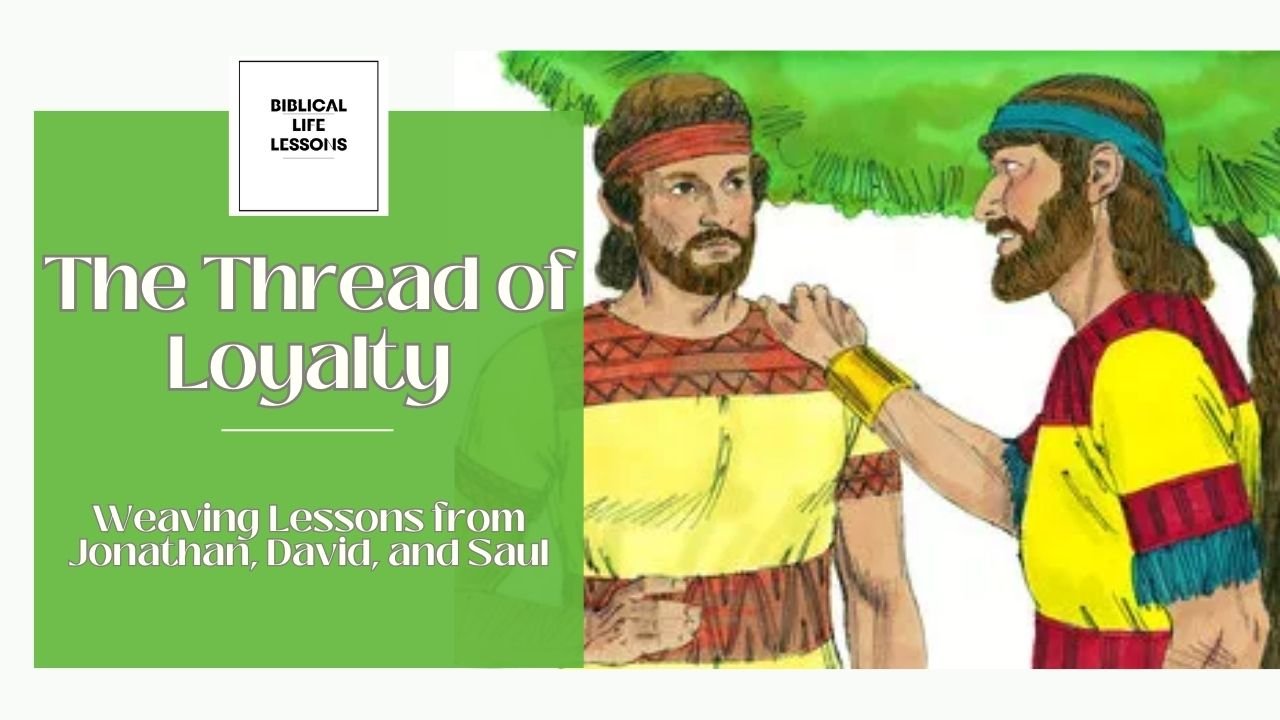In the intricate tapestry of biblical narratives, the story of Jonathan, David, and Saul stands as a powerful testament to the essence of loyalty, friendship, and the human condition. As we delve into the lives of these iconic figures, we unearth timeless lessons that continue to resonate through the annals of history. This exploration unveils the threads of loyalty intricately woven within their relationships and reveals profound insights into our own lives.
Understanding the Bond: Jonathan and David
Jonathan’s Selfless Devotion
Jonathan, the son of Saul, emerges as an embodiment of unwavering loyalty. His genuine friendship with David exemplifies the depth of his character. In a time of political upheaval, Jonathan forms an inseparable bond with David, recognizing his divine calling even though it threatens his own position. This friendship becomes a beacon of loyalty, highlighting the power of standing by a friend despite personal sacrifices.
The Book of 1 Samuel captures the essence of Jonathan and David’s bond: “Jonathan became one in spirit with David, and he loved him as himself.” (1 Samuel 18:1, NIV)
David’s Honorable Respect
David, a shepherd destined to become a king, reciprocates Jonathan’s loyalty with honor and humility. Despite Saul’s animosity, David remains steadfast in his regard for the king, recognizing the sanctity of authority. David’s resilience in the face of adversity and his refusal to harm Saul, even when the opportunity arises, underscores the profound respect he holds for loyalty and divine providence.
David’s own words reflect his unwavering loyalty and respect for Saul’s position: “The Lord forbid that I should do such a thing to my master, the Lord’s anointed, or lay my hand on him; for he is the anointed of the Lord.” (1 Samuel 24:6, NIV)
Navigating Challenges: Saul’s Struggles
Saul’s Erosion of Loyalty
Saul, the anointed king, grapples with jealousy and insecurity as David’s popularity grows. His once-loyal disposition towards David transforms into a consuming obsession to eliminate him. This descent into betrayal and mistrust serves as a cautionary tale, highlighting the corrosive nature of unchecked emotions and their potential to erode the foundation of loyalty.
The Book of 1 Samuel paints a vivid picture of Saul’s internal struggle: “Saul was very angry; this refrain displeased him greatly. ‘They have credited David with tens of thousands,’ he thought, ‘but me with only thousands.'” (1 Samuel 18:8, NIV)
The High Cost of Distrust
Saul’s unraveling loyalty not only impacts his relationship with David but also jeopardizes his connection with his son Jonathan. The strained dynamics within Saul’s family reflect the wider repercussions of fractured loyalty. This narrative reminds us that the erosion of trust can lead to a cascading effect, affecting relationships and even destiny itself.
Jonathan’s heart-wrenching lamentation for his father and friend reveals the depth of the emotional toll taken by distrust: “How the mighty have fallen in battle! Jonathan lies slain on your heights. I grieve for you, Jonathan my brother; you were very dear to me.” (2 Samuel 1:25-26, NIV)
Lessons for Modern Times: The Thread of Loyalty
Integrity in Friendship
The tale of Jonathan and David teaches us that true friendship thrives in the soil of integrity. Loyalty transcends personal gains and requires a commitment to upholding the well-being of the other person. In an era where superficial connections abound, the story encourages us to cultivate friendships founded on honesty and selflessness.
As Proverbs 17:17 reminds us, “A friend loves at all times, and a brother is born for a time of adversity.” (NIV)
Balancing Authority and Humility
David’s reverence for Saul’s authority showcases the delicate balance between loyalty and humility. In contemporary settings, this balance can manifest in workplaces and leadership roles. Honoring those in authority while staying true to one’s principles demonstrates a harmonious integration of loyalty and personal integrity.
The Apostle Paul’s exhortation in Romans 13:1 encapsulates this balance: “Let everyone be subject to the governing authorities, for there is no authority except that which God has established.” (NIV)
Guarding Against Destructive Emotions
Saul’s tragic downfall serves as a stark reminder of the destructive potential of negative emotions. Jealousy, insecurity, and unchecked ambition can corrode loyalty, leading to a path of ruin. Recognizing and managing these emotions within ourselves can prevent the unraveling of relationships and preserve the fabric of loyalty.
The Book of Galatians offers guidance on conquering such destructive emotions: “But the fruit of the Spirit is love, joy, peace, forbearance, kindness, goodness, faithfulness, gentleness and self-control.” (Galatians 5:22-23, NIV)
Weaving Loyalty into Our Lives
The story of Jonathan, David, and Saul weaves a tapestry of loyalty, friendship, and the human experience. Through their triumphs and tribulations, we glean invaluable insights that transcend time and culture. As we navigate our own journeys, the thread of loyalty remains a guiding light, inspiring us to forge genuine connections, uphold integrity, and safeguard against the pitfalls of destructive emotions. Just as these ancient figures left an indelible mark, we too can weave loyalty into the fabric of our lives, leaving a legacy of enduring relationships and unwavering devotion.
In the grand tapestry of life, the thread of loyalty remains an essential element that binds hearts, transcending eras and echoing the essence of what it means to be truly human. Let us take these lessons from the lives of Jonathan, David, and Saul, and weave them into the very core of our being, forging relationships that stand the test of time.
Subscribe for Daily Email Devotionals










